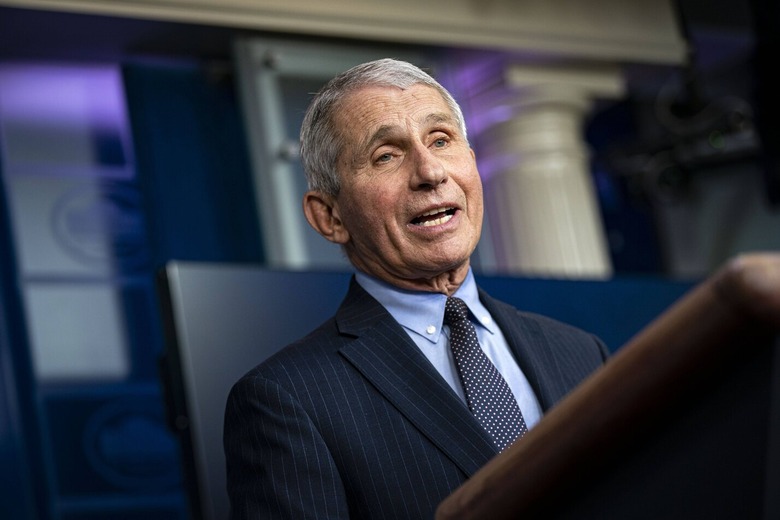You Need To Read Dr. Fauci's Ominous New Coronavirus Warning
- More contagious COVID-19 strains from the UK and South Africa are already spreading across dozens of US states.
- The new strains threaten to hamper what has been tremendous progress in the battle to lower the coronavirus infection rate.
- New COVID-19 infections have been dropping significantly over the past few weeks and have fallen by 43% over the last two weeks alone.
Over the past 12 months, the coronavirus pandemic has wreaked an unprecedented amount of havoc on the United States. To date, the U.S. has seen nearly 28 million coronavirus infections and more than 490,000 COVID-related deaths.
The good news, though, is that we're finally starting to see marked progress in the effort to defeat the coronavirus once and for all. For starters, the COVID infection rate has dropped by 43% over the last two weeks alone. In fact, the COVID infection rate today is about as low as it was all the way back in October. What's more, coronavirus-related hospitalizations and deaths are both down by more than 30% over the last two weeks.
Beyond that, the COVID vaccination effort — after a sluggish start — is currently moving along faster than many health experts predicted. While the initial goal was to administer 1 million vaccine doses every single day, the U.S. today is averaging about 1.6 million vaccine doses per day. Consider this: from last Thursday through Sunday, an average of 1.9 vaccine doses were administered every single day.
All told, there's finally a reason to be optimistic that the coronavirus pandemic will be nothing more than a distant memory by this time next year. Still, it's important to remember that we're not out of the woods yet. Despite an encouraging drop-off in the infection rate and a promising vaccination effort, new COVID strains from the UK and South Africa have many health experts concerned.
As you've likely heard by now, the new COVID strains from the UK and South Africa are 50% more contagious than the original strain because they're believed to cause longer periods of infection.
A recent Harvard study notes:
These data offer evidence that SARS-CoV-2 variant B.1.1.7 may cause longer infections with similar peak viral concentration compared to non-B.1.1.7 SARS-CoV-2, and this extended duration may contribute to B.1.1.7 SARS-CoV-2's increased transmissibility. The findings are preliminary, as they are based on seven B.1.1.7 cases. However, if borne out by additional data, a longer isolation period than the currently recommended 10 days after symptom onset may be needed to effectively interrupt secondary infections by this variant.
Both strains are already in the U.S. and some experts believe the UK strain could become dominant as soon as next month.
Even more problematic is that the South African strain is somewhat more resistant to existing COVID-19 vaccines. There is also speculation that both strains are deadlier than the original.
In light of the above, Dr. Fauci cautions that people should still follow existing coronavirus safety guidelines because the new strains have the potential to cause massive outbreaks.
"The number of cases is diminishing on a rather steep downward trajectory right now," Fauci said. "That can turn around and go the wrong direction if we have a predominance of a virus that has a better degree of transmissibility. This variant situation is dominating the picture a bit."
At this point, there's almost something of a race to vaccinate as many Americans as possible before more contagious COVID-19 strains become dominant. Of course, the vaccination effort itself is hindered by two variables: a limited vaccine supply and a general distrust of the COVID-19 vaccine itself.
To this point, Fauci said:
But when you have a degree of vaccine hesitancy in the general community — people who are vaccine denialists or skeptical or hesitant — we don't have any good mechanism to get the general public vaccinated. You can do that in schools or hospitals. Elsewhere that's really a problem.
To achieve herd immunity, an estimated 75 to 80% of the country will need to get vaccinated, or about 260 million people. To date, nearly 41 million Americans have received at least one dose of the COVID-19 vaccine, which is to say it may take a few more months to reach herd immunity.
The good news is that Johnson & Johnson's one-shot COVID-19 vaccine could receive an Emergency Use Authorization from the FDA later this month. If that happens, the supply of COVID-19 vaccine doses in the U.S. would increase significantly and would help accelerate the vaccination effort.
